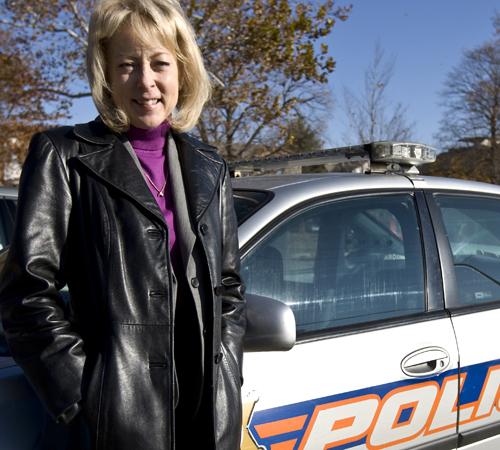UI police chief moving to Police Training Institute

Kris Fitzpatrick, University chief of police, is starting a new job Friday as the director of the Police Training Institute. Fitzpatrick looks forward to the challenge of the new job at the PTI. Erica Magda
November 16, 2007
Chief of University Police Krystal “Kris” Fitzpatrick will assume her position as director of the Police Training Institute on Friday, replacing former director Tom Dempsey who resigned in October after it was revealed he had made questionable personal arrangements with Blackwater USA while negotiating a University contract with the security company.
The institute and Blackwater had considered a partnership, but it was cancelled after Dempsey’s actions were made public.
“There was a memorandum of understanding between PTI and Blackwater that would allow instructors to be swapped and the two parties to work together,” said Coralyn Beem, interim director of PTI. “But there was never any training or enforcement of (what was laid out in) the memo.”
After Dempsey’s resignation, Beem was appointed to “hold down the fort” while the University looked for candidates to succeed the former director, she said. The University administrators then approached Beem with their desire to have Fitzpatrick fill the position and asked for her opinion.
Beem believes Fitzpatrick will be “marvelous” at PTI.
Get The Daily Illini in your inbox!
A slender woman with bright blue eyes, light blond hair and a cheerful, but authoritative disposition. Upon first introduction, she doesn’t seem to be the kind of person associated with law enforcement.
“When I was 23 years old in the early ’70s, I was the first woman to take the test for the Champaign County Sheriff’s Department,” Fitzpatrick said. “I had one of the top three scores, and I met with Everett Hedrick, who was the sheriff at the time, and he said to me, ‘I’ll never hire a woman.'”
At Hedrick’s suggestion, Fitzpatrick went to Parkland College and earned a two-year degree in criminal justice. Fitzpatrick then decided that University policing was what she wanted to do and began working as a patrol officer for the department.
Then as a detective.
Then as a shift supervisor.
Then in the department of investigations.
Then as a captain.
Then as assistant chief.
For the last two years, Fitzpatrick has held the title of interim chief.
“She has 30 years of experience as an officer and has worked through the ranks,” Beem said. “She is a great leader … and widely respected within her own agency, who describe her as fair, thoughtful and a good leader.”
Fitzpatrick admits that rising to the position of chief in the University department, as a woman, was no easy task.
“It has been a challenge,” she said. “But you get to work with such great people. I love the people, and I love the work.”
Fitzpatrick is excited to work with officers who are just beginning their careers, and sees her new position at the institute as a recharging experience.
“I had to think long and hard about (accepting the position) because I’ve been up for retirement for three or four years now,” Fitzpatrick said. “But I see it as starting over in familiar territory – you’re never too old to learn something new, and that’s been my job philosophy forever.”
Fitzpatrick’s outstanding record of service and leadership in campus safety and law enforcement make her the ideal individual for this role, Provost Linda Katehi wrote in an e-mail Thursday.
Fitzpatrick said the change in careers has come at just the right time for her, and as director of the institute, she will be able to continue to work in a field she believes in.
“Generally in this job, people aren’t calling you up because they’re having a good day,” she said. “But if you realize that you can make a difference in someone’s life, then that’s the rewarding part.”






